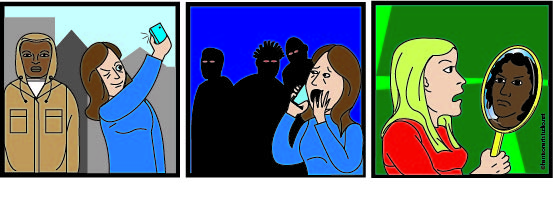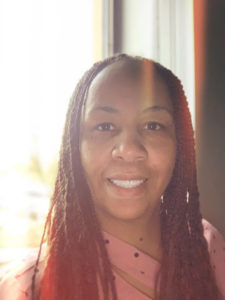Jolted Awake: A Cautionary Tale
Year after year, Karen reveled in her whiteness, the inherent superiority she felt. For white privilege had played a part in many of her life’s joys and successes. She’d spent years demonizing Black and Brown people with hateful words, glares and everyday decisions. She took delight in the evil schemes political leaders drafted to suppress hope, liberty and justice to people of color.
Karen used her cell phone like a whip; one call from her could strike fear in the hearts of Black men, women and children. She’d often admonished the Black victims of police brutality she saw on TV for failure to comply and scoffed at protests against police violence and calls to defund police departments.
At church every Sunday, Karen is certain her actions are justified and will lead her one day to heavenly rewards. But at the end of her life, the streets of gold she’d anticipated do not materialize. Instead, she’ll face the otherworldly consequences of her bigoted life. . .
Shackled with many others aboard a ship, which rocks and reeks of foul odors and disease, she is jolted awake to intolerable heat and misery. So many dark-skinned people. She looks down at her hand — aghast to see skin the color of a ripe plum. As the ship hauling enslaved people navigates the crashing Atlantic waves outside, waves of seasickness wrack her ailing body. The incomprehensible cruelty of chattel slavery is too grotesque to witness so she closes her eyes to the suffering of dark-skinned souls just as she had while on Earth, but this time she is jolted awake.
Driving a shiny silver luxury sedan, Karen wears her white privilege like the finest haberdashery. Police sirens scream into the evening. She pulls over, frustrated with the interruption. As she reaches for identification, she’s shocked to see skin the color of an espresso bean, instead of the pale alabaster she’d idolized all her life. Each step the officers make toward her echoes like sonic booms. Apprehension quickens her heartbeat. Aggressively, police yank her out of the car and onto the ground. Bewildered, her body naturally recoils from the officers’ grasps. Time stops. She hears snatches of sound. Someone says, “Stop resisting!” Terror grips her. Her airway is constricted by an officer’s knee. She cries out, “Mother!” But, her mother is not there. “I can’t breathe,” she tells the blue figure pinning her down.
George Floyd pops into her mind, but she swiftly dismisses thoughts of the Minneapolis man whose violent death in police custody sparked worldwide protests. She has done nothing to warrant this treatment. The police just don’t go around harassing, arresting and hurting people who don’t deserve it. Right? So just as she had while on Earth, she closes her eyes to the realities of police brutality. “I can’t breathe!” she tells the hulking officer and bystanders, her life fading away to a flat line.
DOA. But she is jolted awake and packed inside a cage with hundreds of people of earthen tones — dark amber, wheat, copper and bronze. She looks down at her caramel-colored hands, which are far from the ‘lily-white’ hue she’d often coveted. Women sat nearby holding babies. Others stood with fingers laced through the cold fencing. Hopeless. Suddenly, nausea overtakes her frame. She begs for help, for answers. Others cry out for water, food and medicine. She demands freedom — the same kind sought by the brown souls around her who had risked perilous escapes from violent homelands only to arrive in the U.S. — to be caged, separated and discarded. Mothers and fathers banished to strange cities on the opposite side of imaginary man-made lines, while their children become orphans of the state. A detention officer swoops in, quieting her commotion. Expressionless, he punches her in the stomach, and she falls onto the crowded floor, unable to withstand the blow, the crush of bodies, her thirst. She shuts her eyes to the suffering of brown people — just as she had while on Earth. But she is jolted awake.
Walking along a crowded sidewalk, Karen is nearing a group of young Black adults holding “Vote” signs. She eyes a glimpse of herself in a passing storefront window and stares incredulously at curly hair and skin the color of black patent leather shoes, “Blacccck!” She’d always dragged that word out, expelling it dramatically from her tongue. She feels relief at the sight of white police officers up ahead, but she can’t understand the anger reflected in their stance.
White men with hungry eyes and angry dogs ready to pounce. The officers push the animals toward them. A guttural cry leaps from her as the dog mauls her body. Its teeth rip her clothes and sink into her flesh. Her legs buckle from the excruciating pain. The officers remain indifferent, carrying out vicious dog attacks with one hand while wielding black police batons in the other. Ripped flesh, torn arteries and numerous dog bites pepper her petite frame, and when the traumatization reaches its pinnacle — she drops onto her knees. Others run screaming from the police. Crying out for mercy, she slams her eyes shut to the incomprehensible scene of police brutality. Just as she had while on Earth.
But she is jolted awake.
When George Floyd cried out for his mother, how did that make you feel? Why?
Do you ever examine the beliefs you hold about the police or about people of color who are more often the victims of police violence? Why or why not?
What will it take for all Americans to be jolted awake to the reality of police brutality before it’s too late?

